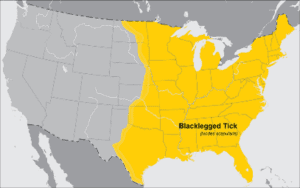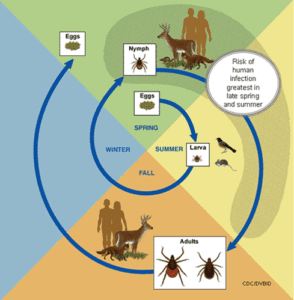Parasite Prevention: Protect Your Pets – Protect Your Family
We have all been living with restrictions on our lives because of COVID 19…and these are certainly important to keep us safe. But COVID will be conquered with good hygiene and by developing cures and a vaccine in the future.
Did you know there are other dangerous diseases we can contract because of our environment and the animals we live with?
The Charlotte, NC area is blessed with the beauty of lush green fields and forests. Hiking, visits to Lake Norman, dog parks, and other outdoor activities are popular for many of our residents. Unfortunately, we are not the only ones who enjoy all this foliage. Ticks find excellent habitats in brush and trees.
The Companion Animal Parasite Council (CAPC) tracks the prevalence of parasite-borne diseases in the US and Canada for dogs and cats. Every year, they build a “risk map” of the US to warn veterinarians and the public about diseases reported in animals spread by parasites. Listed below are the diseases humans can catch from local parasites and their symptoms. The list was procured from the 2019 United States map and then narrowed down to Mecklenburg County. Here are the case results:
Tick-Borne Disease Cases
- 460 positive cases of Lyme Disease – Lyme disease is the most
 common vector-borne disease in the United States. Lyme disease is caused by the bacterium Borrelia burgdorferi. It is transmitted to humans through the bite of infected blacklegged ticks (see map for habitat). Typical symptoms include fever, headache, fatigue, and a characteristic skin rash called erythema migrans. If left untreated, infection can spread to joints, the heart, and the nervous system.
common vector-borne disease in the United States. Lyme disease is caused by the bacterium Borrelia burgdorferi. It is transmitted to humans through the bite of infected blacklegged ticks (see map for habitat). Typical symptoms include fever, headache, fatigue, and a characteristic skin rash called erythema migrans. If left untreated, infection can spread to joints, the heart, and the nervous system. - 191 cases of Anaplasmosis – Anaplasmosis a disease caused by the bacterium Anaplasma phagocytophilum. These bacteria are spread to people by tick bites primarily from the blacklegged tick (Ixodes scapularis) and the western blacklegged tick (Ixodes pacificus). People with anaplasmosis will often have fever, headache, chills, and muscle aches.
- 586 cases of Ehrlichiosis – People with ehrlichiosis will often have fever, chills, headache, muscle aches, and sometimes upset stomach. It is often mistaken for the flu. In May 2017, an article in the CDC’s Emerging Infectious Diseases Journal, warns that ehrlichiosis infections are being “grossly underreported” in the U.S. with as many as 97-99% of infections going unrecognized in humans. Ehrlichia is passed by the bite of infected ticks including the lone star tick (Amblyomma americanum) and the blacklegged tick
- Rocky Mountain spotted fever (RMSF) – RMSF is a potentially fatal human illness caused by the bacteria Rickettsia rickettsii, which is transmitted to humans by the bite of an infected tick. In the United States, ticks that carry RMSF include the American dog tick, the brown dog tick, and the Rocky Mountain wood tick. These cases are not reported on CAPC but the CDC has seen an increased incidence of this disease and NC is a high-risk state according to epidemiology maps.
Intestinal Parasite Cases
- 505 cases of Roundworm – Individuals infected with roundworm parasites may show: abdominal pain, diarrhea, cough, blood-tinged sputum, shortness of breath, asthma, fever (from migrating parasites that invade the lungs), muscle pains, abscesses, lymphedema and even “worms” visible in the patient’s eye causing blindness.
- 1382 cases of Hookworm – Initially, itching and a rash may occur at the site of human infection. Usually these parasites enter through a cut or scratch in the skin exposed to contaminated soil. Those only affected by a few worms may show no symptoms. Those infected by many worms may experience abdominal pain, diarrhea, weight loss, and tiredness. The mental and physical development of children may be affected. Anemia may result.
- 1726 cases of Giardia – Giardiasis is caused due to parasite infection that spreads through contaminated water and food. It causes diarrhea, vomiting, loss of appetite, pain and fatigue.
 We are shocked to think about Lyme in our area because it was always considered a problem in Northern States. With the increase in development, wildlife has been forced to migrate into our backyard. In addition, people are traveling with pets more than ever. Natural disasters result in infected animals being rescued and adopted into non-endemic areas. After Hurricane Katrina, pets were adopted from Louisiana to families all over the country. Veterinarians found dogs positive for heartworms in Alaska for the first time. Today, heartworms are found in all 50 states. Warm, moist weather common in the Matthews, Mint Hill, and Stallings area allows parasites to thrive.
We are shocked to think about Lyme in our area because it was always considered a problem in Northern States. With the increase in development, wildlife has been forced to migrate into our backyard. In addition, people are traveling with pets more than ever. Natural disasters result in infected animals being rescued and adopted into non-endemic areas. After Hurricane Katrina, pets were adopted from Louisiana to families all over the country. Veterinarians found dogs positive for heartworms in Alaska for the first time. Today, heartworms are found in all 50 states. Warm, moist weather common in the Matthews, Mint Hill, and Stallings area allows parasites to thrive.
Our goal is not to scare you into avoiding your pets or the outdoors. But awareness is the best way to prevent problems for you and your pets. Our annual blood screening for heartworms and tick-borne diseases tests for Lyme, Ehrlichia, and Anaplasma. The monthly flea and tick products we sell are proven to prevent these parasites from spreading diseases to your pets in addition to being a monthly dewormer which kills the intestinal hookworms, roundworms and whipworms they may pick up from the soil. Products like Credilo, Seresto Collars and Advantage Multi are solutions. Ask us about the best match for your pet’s lifestyle and even order it from our Home delivery pharmacy 🙂
In addition, you can help prevent contamination in your yard by:
- Immediately picking up poop.
- Keeping bushes trimmed and underbrush cleaned out.
- Remove leaf litter.
- Clear tall grasses and brush around homes and at the edge of lawns.
- Place a 3-ft wide barrier of wood chips or gravel between lawns and wooded areas to restrict tick migration into recreational areas.
- Mow the lawn frequently.
- Stack wood neatly and in a dry area (discourages rodents).
- Keep playground equipment, decks, and patios away from yard edges and trees.
- Discourage unwelcome animals (such as deer, raccoons, and stray dogs) from entering your yard by constructing fences.
- Wash water bowls daily and don’t let your pets drink from standing pools of water.
- Wash your hands after petting your dog or cat. They find many interesting things to investigate that may be contaminated.
We love them but the odd things they choose to get into makes us scratch our heads!
The CDC has great recommendations for tick disease prevention on their page, CDC Avoid Ticks on People. Caring Hearts Animal Hospital’s team is always here to answer any questions you may have about your pet and their care.
Please feel free to share this article with your friends and family and even your kids’ school.
Veterinarians are highly aware of the encroachment of these parasitic diseases because of our close involvement with animals. Human health providers are not always as attuned to these trends.
We care for our clients and our patients and want you all to be healthy! Let’s all take wise precautions and enjoy our wonderful outdoor environment.
Recent Posts
About Us
At Caring Hearts Animal Hospital, we’re not your typical veterinarian in Matthews, NC. We have been welcoming dogs and cats from Mint Hill, Indian Trail, and Union County for over 15 years, and our team is comprised of pet owners, too–so we appreciate the bond you share with your companions!
